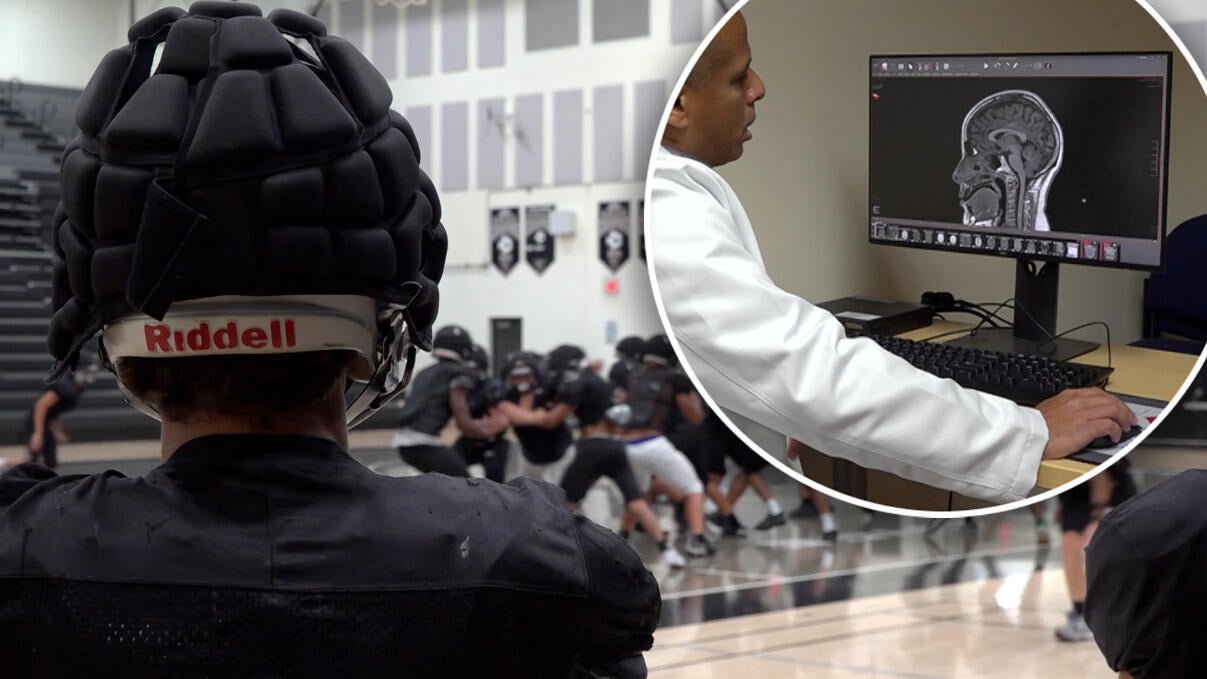South Florida high school football teams tackle concussion concerns with added protection
High school football programs in South Florida are taking new steps to address concussion risks, with John A. Ferguson Senior High School outfitting players with Guardian Caps, a soft protective shell worn over helmets.
Quarterback Ryan Ramirez said the extra layer adds peace of mind.
"Our helmets are protective, they're good, but this extra layer makes you feel comfortable," Ramirez said.
Head coach Gene Chew said the team has used the caps for the last five years, and they serve both as protection and a reminder for safer technique.
"Our head-to-head contact has reduced dramatically, and our technique also comes into play with that," Chew said. "I think it makes the players aware because it's so bulky and cushiony, so it's a little bit different than just the helmet. It actually makes them more aware that we're trying to keep the head out of the contact."
Chew credited improved tackling form as equally important, emphasizing a step-by-step method that avoids helmet-to-helmet collisions.
"We actually go step-by-step putting your knee in between the legs, crouching down as if you were a wrestler and putting your head to the side of the hip, and then wrapping up rather than running through helmet to helmet," he said.
Concussion risks remain high among teen athletes
The push for protection comes amid growing awareness that children are especially vulnerable to concussions because their necks are weaker and their brains are still developing.
"The numbers are staggering; there are about 3.6 million concussions annually in the country, out of those most of them happen between the ages of 15-24," said Dr. Wilson Heredia, medical director of Nicklaus Children's Hospital headache and concussion program.
He said 2.7 million kids under 18 experience concussions each year, though the real number may be higher because not all cases are reported.
Heredia noted football is the leading cause of concussions among high school and college boys.
Players said they are aware of the risks.
"I've had one before and I'm worried about getting hit again, I try to strengthen my neck and keep safe with my head and how I hit," said Luca Rovani, who plays both offensive and defensive line.
Neck-strengthening is one of the most effective preventive measures, said Dr. Matthew Fazekas, medical director of sports medicine at Joe DiMaggio Children's Hospital.
"It all comes down to neck strengthening exercises, the more we can stabilize the head to neck to chest access the less rotation can be imparted on the brain and the less likely you'll have enough force to actually cause a concussion," Fazekas said.
Doctors urge caution and safe return-to-play protocols
Schools in Miami-Dade and Broward counties also require athletes to take a baseline neurocognitive test before the season.
"This gives us a snapshot at how their brain is working, it looks at reaction time and impulse control processing speeds," Fazekas said.
Still, doctors cautioned it is unclear if helmet covers like Guardian Caps significantly reduce risk.
"There are some good studies that show that if you give some of these products to athletes, they feel invincible they feel like superman and so we just have to be cautious," Fazekas said.
For players like Rovani and Ramirez, the caps add reassurance.
"I definitely feel safer with it on," Rovani said.
"I'm super glad that we can use them every day, I feel secure," Ramirez said.
Doctors emphasized the importance of rest and strict return-to-play protocols.
"If they do go back early, they incur the risk of having another concussion, it can be detrimental, it can be fatal because of brain edema, or they can make their symptoms last longer," Heredia said.
Fazekas added: "The real damage can come when that athlete continues to play despite having this brain injury and then takes a second hit."
Common concussion symptoms
- Headache
- Dizziness
- Irritability
- Confusion
- Sensitivity to light or noise
- Sleep disruption
Doctors urged parents to monitor their children and seek medical care if those symptoms appear.
